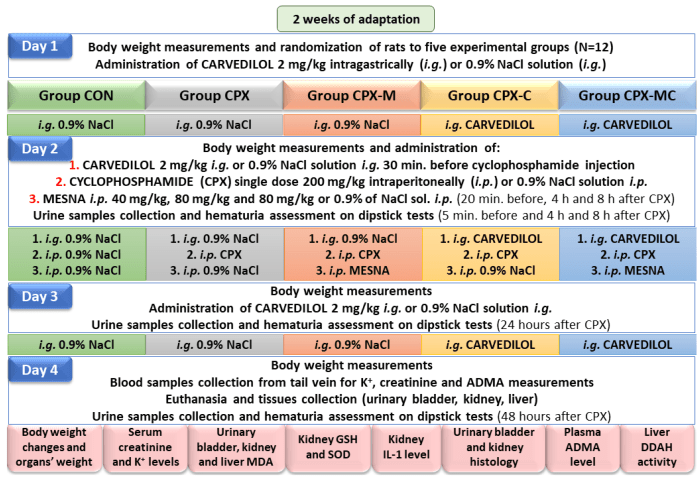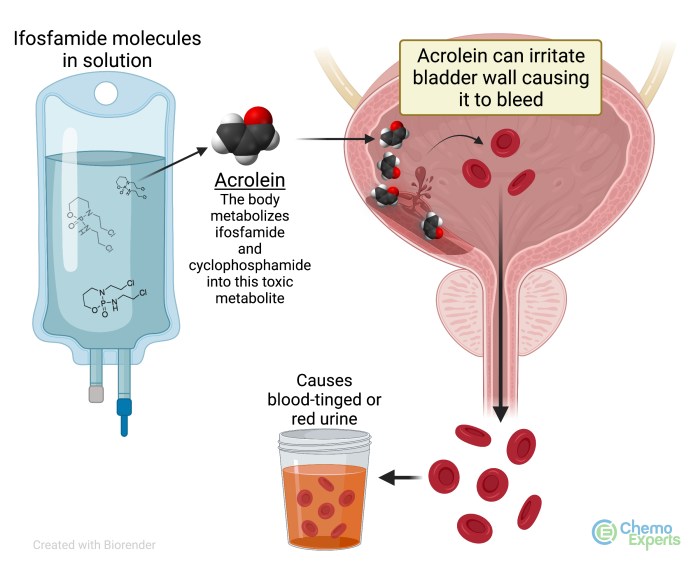You are administering cyclophosphamide and mesna to a client – When administering cyclophosphamide and mesna to a client, nurses play a critical role in ensuring safe and effective medication administration. Cyclophosphamide, an alkylating agent, is commonly used in chemotherapy regimens, while mesna acts as a uroprotectant to mitigate cyclophosphamide-induced urotoxicity.
Understanding the mechanism of action of these medications and implementing appropriate nursing interventions are essential for optimizing patient outcomes. This article provides a comprehensive overview of the nursing considerations involved in administering cyclophosphamide and mesna, including preparation, monitoring, and patient education.
Overview of Cyclophosphamide and Mesna

Cyclophosphamide is an alkylating agent used in the treatment of various cancers. It acts by cross-linking DNA strands, leading to cell death.
Mesna is a uroprotective agent that prevents cyclophosphamide-induced urotoxicity by binding to acrolein, a toxic metabolite of cyclophosphamide that can damage the urinary bladder.
Nursing Considerations for Cyclophosphamide and Mesna Administration: You Are Administering Cyclophosphamide And Mesna To A Client

Preparation and Administration of Cyclophosphamide
- Prepare cyclophosphamide according to the manufacturer’s instructions.
- Administer intravenously over 30-60 minutes.
- Flush the IV line with normal saline after administration.
Monitoring Parameters for Clients Receiving Cyclophosphamide
- Complete blood count (CBC) and platelet count
- Liver function tests
- Renal function tests
- Urinalysis
Nursing Interventions for Managing Side Effects of Cyclophosphamide
- Nausea and Vomiting:Administer antiemetics as prescribed.
- Myelosuppression:Monitor CBC and platelet count. Provide supportive care, such as blood transfusions and antibiotics.
Patient Education
Potential Side Effects of Cyclophosphamide and Mesna
| Side Effect | Management |
|---|---|
| Nausea and Vomiting | Take antiemetics as prescribed. |
| Myelosuppression | Avoid contact with people who are sick. Wash hands frequently. |
| Urinary Tract Irritation | Drink plenty of fluids. Urinate frequently. |
Importance of Adhering to Medication Schedule and Follow-up Appointments:Explain the importance of taking medication as prescribed and attending follow-up appointments to monitor progress and manage side effects.
Case Study

Client Presentation
A 50-year-old male with stage III non-Hodgkin lymphoma is receiving cyclophosphamide and mesna as part of his chemotherapy regimen.
Medical History
- Non-Hodgkin lymphoma
- No other significant medical history
Physical Assessment Findings
- General: Alert and oriented, no acute distress
- Skin: No rashes or lesions
- Respiratory: Breath sounds clear, no wheezing or crackles
- Cardiovascular: Regular heart rate, no murmurs or gallops
- Abdominal: Soft and non-tender, no hepatosplenomegaly
Laboratory Results
- CBC: Mild leukopenia, normal platelet count
- Liver function tests: Normal
- Renal function tests: Normal
- Urinalysis: No abnormalities
Nursing Care Plan, You are administering cyclophosphamide and mesna to a client
- Medication Administration:Administer cyclophosphamide and mesna as prescribed.
- Monitoring:Monitor CBC, platelet count, liver function tests, renal function tests, and urinalysis.
- Patient Education:Provide education on potential side effects and management strategies.
Answers to Common Questions
What is the primary nursing responsibility when administering cyclophosphamide and mesna?
Ensuring safe and effective medication administration, including proper preparation, monitoring for adverse effects, and providing patient education.
How does mesna protect against cyclophosphamide-induced urotoxicity?
Mesna acts as a scavenger for acrolein, a toxic metabolite of cyclophosphamide that can damage the urinary tract.
What are the common side effects associated with cyclophosphamide?
Nausea, vomiting, myelosuppression, hair loss, and increased susceptibility to infections.